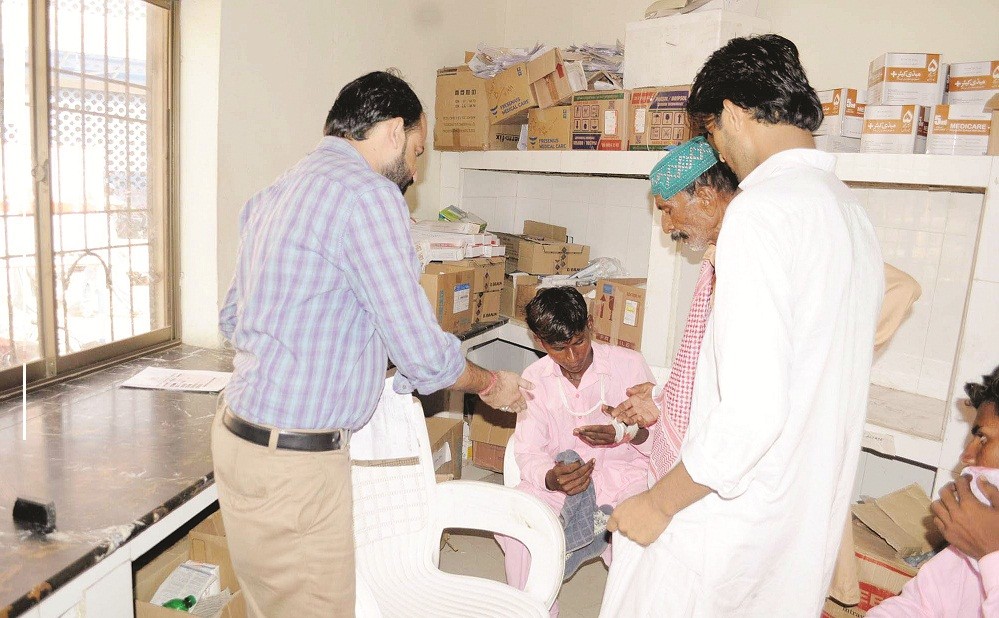
Given the high incidence of dog bites, the unavailability of rabies vaccine is a cause for concern

Last week, social media users were shocked when a video of a child went viral in Pakistan. The video showed the child lying on a hospital bed, moaning and barking like a dog; he had been bitten by a stray dog. While the clip was only a minute and half long, it encapsulated the condition of the child - unable to respond to simple questions; such as what his name was.
Social media users were quick to criticise the Pakistan Peoples Party-led Sindh government, and blamed the administration for failing to protect vulnerable citizens, particularly children from preventable diseases like rabies.
The Health Department questioned the authenticity of the video. It said that it was a case of rabies in India, and that the footage had been doctored to claim that it was a case from Sindh. While facts of this particular case remain questioned; there is no doubt that rabies is currently a problem in Pakistan.
In September 2019, a video from Shikarpur, had gone viral. It showed a child named Meer Hassan who died from rabies. The government hospital in the area had run out of the anti-rabies vaccine (ARV). People were quick to blame the PPP and its chairperson Bilawal Bhutto Zardari for not tackling the rabies problem with the alacrity it demanded.
According to a recent study by Aga Khan University School of Nursing and Midwifery, on Epidemiology of rabies in Pakistan 2,000 to 5,000 deaths were reported annually due to rabies, in Pakistan.
"Over 30,000 people die each year from rabies in Asia. Out of those 15 percent are children under 15 years of age" The study reports that "over 3 billion people in emerging countries in Asia are prone to dog rabies."
"Rabies is a neglected disease in Pakistan, although the incidence of dog bites in the country is very high. In 2010, more than 97,000 cases of dog bites were reported by basic health units. Those managed by secondary and tertiary care facilities, private practitioners and spiritual healers and hakims are not recorded," said a study by the WHO.
In August 2019, Sindh Health Minister Azra Pechuho told Sindh Assembly that over 92,000 cases of dog bites had been reported across Sindh from January 2019 to June 2019. Most of the cases were from Larkana district.
After the large number of cases were reported, public hospitals across the province started running out of the vaccine and its price at private centres rose by 100 percent – from Rs 600 for a single dose to Rs 1200.
According to Dr Seemin Jamali, executive director of Jinnah Postgraduate Medical Centre (JPMC), the number of dog bite cases has increased in recent months. "We get dog bite cases not only from Karachi but also from across the province and Balochistan. The number of cases has increased in recent months, we have sufficient anti-rabies vaccine for now, but if the number of cases reported continues to be large we will not be able to provide vaccines in the future," she said.
Pechuho says that in the past Pakistan government used to purchase ARV from a Chinese company, but after China became rabies free, the company that used to manufacture the vaccine shut down recently.
"Then we used to import ARV from India, but due to tensions between India and Pakistan over the Kashmir issue, India has stopped supplying vaccines. This has caused the drastic shortage," she said.
"We are currently producing 200,000 vaccine doses and providing them to all four provinces, but now we are going to increase production by 100,000 doses," said a report submitted by the National Institute of Health (NIH)’s biological production division representative; Ghazala Parveen to Sindh High Court. It is to be noted that the NIH has been the only public sector vaccine manufacturer in the country for the past seven decades.
Reacting to the alarming number of dog bites, the Sindh government has set up a complaint cell, which receives dozens of complaints from almost every district on a daily basis.
Annoyed by the mounting public pressure and criticism, the municipalities across Sindh, especially in Karachi, have started large-scale dog killing operations; where they feed poisoned meat to stray dogs. However, this has elicited backlash from Animal rights groups, who filed a petition against the mass killings of dogs in Karachi, at the Sindh Court in 2016.
After criticism on mass-scale killings, authorities have started carrying out surgical sterilisation and vaccinations of stray dogs, so that dog bites do not result in rabies.
Dr Naseem Salahuddin, is a senior infectious disease specialist of a charitable hospital who joined the city government of Karachi for a project Rabies-Free Karachi (RFK) in 2018. According to him, a project was carried out in the coastal settlement of Ibrahim Hyderi and low income areas of Landhi and Korangi under which 3,500 dogs were vaccinated and 1,500 were neutered.
Environmental experts believe that the Sindh government’s negligence of garbage collection across the province has resulted an increase in the stray dog population along with stray cats, crows and mice. The leftover garbage piles around each corner attract these scavengers to urban centres.
In recent months, the Edhi Foundation, has announced a dog catcher campaign, through which the foundation will catch stray dogs from residential areas in Karachi and shift them to the Edhi Animal Welfare Centre.
Faisal Edhi, chief of Edhi Foundation, said that the campaign was launched after receiving a plethora of dog bite cases from Lyari, Landhi, Korangi, Surjani, Baldia Town, Mehmoodabad, Liaquatabad, North Karachi, New Karachi, Keamari and other areas.
The WHO is also working with the provincial governments in Pakistan on rabies transmission, prevention and self-protection.